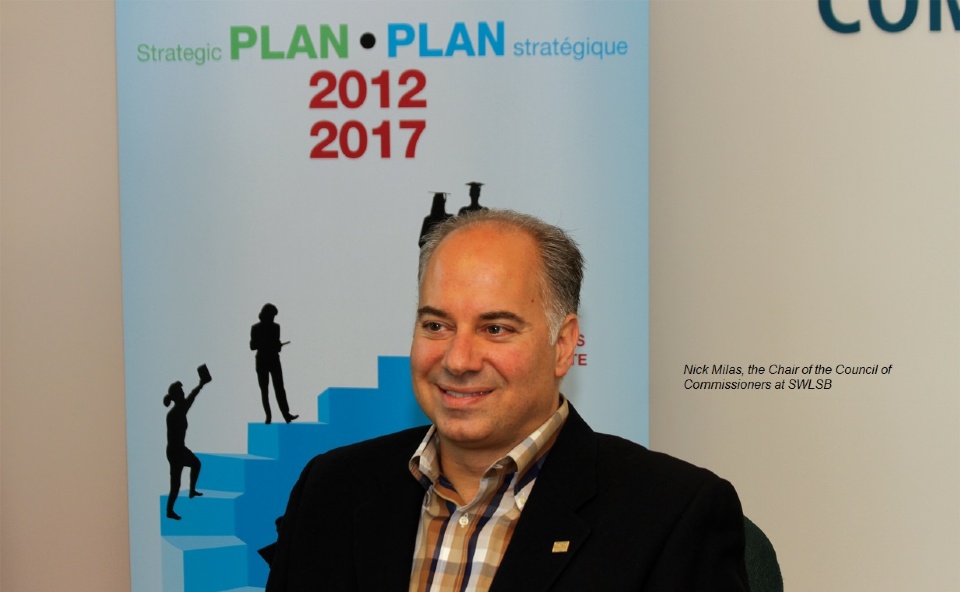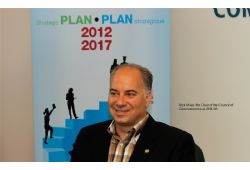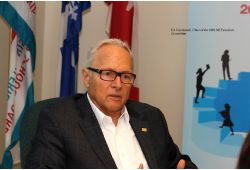Have you ever wonder how improvements to
your child’s school playground, sports facilities, cafeteria food or modernization
of school programs and technology actually come into being?
At the top level of school board
decision-making is the Council of Commissioners, a group of 19 elected members
who work tirelessly behind the scenes alongside the Director General of the board
for the betterment of services to its students.
At the Sir Wilfrid Laurier School Board
(SWLSB), each elected member represents his/her own electoral division. These divisions span a vast territory
covering the regions of Laval, Lanaudière and Laurentides. In addition to the 19 elected commissioners,
there are also two elected parent commissioners, one for the elementary level
and one for the secondary level.
The
commissioners attend monthly meetings to tackle important issues on multiple
levels, be it balancing budgets, adopting policies, zoning regulations, or
acquiring new programs and 21st century technology tools for its
students. These meetings are open to the
public and two question periods are integrated into the agenda so that the
public may address the Council directly.
Nick Milas, the Chair of the Council of
Commissioners at SWLSB, sees his role as one that unifies stakeholders. “The
role of Council is to be the ambassadors between the community, the tax payers,
the parents and the Directorate team under the leadership of our Director
General,” says Milas, who was educated in Laval, and has been a commissioner
for 28 years, and Chairman for the last 2 years. Since, Milas has, with
Council, spearheaded several important innovations- from a restructuring in the
Laval high schools to allow all students access; to a vision of BYOD and
Chromebook deployment at Lake of Two Mountains High School for all secondary 1
students. In times of over 6 M dollars in budget cutbacks from MELS, Milas’
approach has been to find ways to generate revenues rather than cut- for
instance, the recent approval of a new business of “Services aux entreprises”
in the Laurentides region and a larger scale project for International students
in vocational training. “Our employees are the heart of this board, budget cuts
need us to look at other ways of doing, not just cutting people. Instead we
need to grow and change our ways of doing.” insists Milas.
In addition to the Council of
Commissioners, another governing body within the board assists in important
decision-making. The Executive Committee is made up of seven elected
commissioners and two parent commissioners, and the work of this group is
mandated by the Education Act. “The Executive
Committee acts in a supporting role to Council, such as taking care of certain
financial decisions that can be made,” explains Ed Turchyniak, Chair of the
SWLSB Executive Committee. Turchyniak is
also a co-founder of the Sir Wilfrid Laurier Foundation, which, since its inception
in 2004, has raised over 550 000 dollars given directly to schools and centres.
“According to the delegation of power,
Executive Committee can assist in making decisions on approving long-term
loans, tax refunds, transportation contracts, or other services,” says
Turchyniak. Executive Committee also makes decisions on certain educational
services, special projects or partnerships with other boards when the demand
arises, in order to lighten the load of the Council of Commissioners.
“We are such a diverse group of people
all offering our expertise for the benefit of the students, working long
hours…It’s a passion; you have to love education and that’s why we are doing
this,” adds Turchyniak, who has been a commissioner for the board for over thirty years.
There are also other advisory committees
comprised of all commissioners which help in the decision-making process., The
Corporate Committee and the Pedagogical Committee are committees of the whole
where important issues are discussed at length, information is shared, hence
allowing, Council to make informed decisions.
Contrary to popular belief,
commissioners do not earn high salaries.
In fact, many of them have full-time jobs above and beyond their duties
as a commissioner. The total budget for the Council of Commissioners of the
SWLSB is approximately 200 000 dollars, which covers all salaries and any
expenses necessary for its operation.
When compared to the total school board budget, it is merely a
fraction. The average salary of a commissioner
is approximately 6000 dollars per year, and about 21 000 dollars per year for
the Chair. Despite this, commissioners
dedicate a huge amount of their time attending their local community events,
researching and reading reports, attending meetings and participating in countless
special meetings, all to be prepared to make the best decisions possible for
their community.
“It’s not just about going to a monthly
meeting and showing up. It’s about all
the preparation and research that has to happen beforehand so that good
decisions can be made at those meetings,” explains Milas. The school board is obliged to ensure that
all commissioners are trained for their roles and must receive on-going
training throughout their term.
“Even with 6 million dollars in cutbacks,
we have managed to maintain quality services to our students and continue being
innovative to ensure their success. That
is something I take pride in,” adds Milas.
With new ministerial legislation (Bill
88), the Council of Commissioners will go from 19 commissioners to ten in the
upcoming November 2nd school elections. This will result in each commissioner having
multiple schools in their ward covering a larger territory, and the challenge
will lie in unifying the needs of the various communities in order to make the
best decisions for all. The newly
elected Council of Commissioners will be made up of a Chair, four commissioners
for Laval and five commissioners for the Laurentides/Lanaudiere regions. Due to the lower numbers of commissioners,
all commissioners will need to be informed and involved on all dossiers. In a smaller group of decision-makers, it may
be easier and/or more efficient to run meetings.
“As Chair of the Council, I always put
my cards on the table. There is so much
active participation on the part of our commissioners, so much passion and so
much dedication. We take pride in what
we do, and that is a strength of the SWLSB Council,” says Milas. “We make decisions based on what is best for
all of our students.” SWLSB has recently
increased their success rate (graduation rate) by 2<>percentage<>, now standing at 84<>percentage<>.
In the 2007 school elections, 16.3<>percentage<> of SWLSB
voters participated. Your local
commissioner may be campaigning and knocking on your door this Fall, so
consider what issues are important to you and your community and be sure to
remain involved. Commissioners are your
portal to community-wide issues.

 In The Latest Issue:Latest Issue:
In The Latest Issue:Latest Issue:
- Celebrating Community an...
- Celebrating the Unsung H...
- Understanding Newborn St...
Articles
Calendar
Virtual- ANNUAL TEACHER APPRECIATION CONTEST
- APPUI LAVAL
- ARTS & CULTURE
- CAMPS
- CAR GUIDE
- CCIL
- CENTENNIAL ACADEMY
- CHARITY FUNDRAISING
- CITYTV
- COSMODÔME
- COMMUNITY CONNECTIONS
- COVER STORY
- DINA DIMITRATOS
- ÉCOLE SUPÉRIEURE DE BALLET DU QUÉBEC
- EDITORIALS
- ÉDUCALOI
- EDUCATION
- EMPLOYMENT & ENTREPRENEURSHIP
- FÊTE DE LA FAMILLE
- FÊTE DU QUARTIER SAINT-BRUNO
- FAMILIES
- FESTIVAL LAVAL LAUGHS
- FÊTE DE QUARTIER VAL-DES-BRISES
- FINANCES
- GLI CUMBARE
- GROUPE RENO-EXPERT
- HEALTH & WELL-BEING
- 30 MINUTE HIT
- ANXIETY
- CHILDREN`S HEALTH & WELLNESS
- CLOSE AID
- DENTAL WELLNESS
- EXTREME EVOLUTION SPORTS CENTRE
- FONDATION CITÉ DE LA SANTÉ
- GENERAL
- HEARING HEALTH
- MESSAGES FROM THE HEALTH AGENCY OF CANADA
- MENTAL HEALTH
- SEXUALITY
- SOCIAL INTEGRATION
- SPECIAL NEEDS
- TEENS
- THE NUTRITION CORNER
- THE NUTRITION CORNER - RECIPES
- VACATION DESTINATION
- WOMEN'S FITNESS
- WOMEN'S HEALTH
- HILTON MONTREAL/LAVAL
- HOME & GARDEN
- INTERNATIONAL WOMEN'S DAY
- JAGUAR LAVAL
- LAVAL À VÉLO
- LAVAL FAMILIES TV SHOW
- LAVAL FAMILIES MAGAZINE CARES
- LAVAL URBAN IN NATURE
- LE PARCOURS DES HÉROS
- LES PETITS GOURMETS DANS MA COUR
- LEON'S FURNITURE
- LEONARDO DA VINCI CENTRE
- LFM PREMIERES
- LIFE BALANCE
- M.P. PROFILE
- MISS EDGAR'S AND MISS CRAMP'S SCHOOL
- MISSING CHILDREN'S NETWORK
- NETFOLIE
- NORTH STAR ACADEMY LAVAL
- OUTFRONT MEDIA
- PASSION SOCCER
- PARC DE LA RIVIÈRE-DES-MILLE-ÎLES
- PÂTISSERIE ST-MARTIN
- PIZZERIA LÌOLÀ
- PLACE BELL
- PORTRAITS OF YOUR MNA'S
- ROCKET DE LAVAL
- SACRED HEART SCHOOL
- SCOTIA BANK
- SHERATON LAVAL HOTEL
- SOCIÉTÉ ALZHEIMER LAVAL
- STATION 55
- STL
- SUBARU DE LAVAL
- TECHNOLOGY
- TEDXLAVAL
- TODAY`S LAURENTIANS AND LANAUDIÈRE
- TODAY`S LAVAL
- WARNER MUSIC
- THIS ISSUE
- MOST RECENT
Magazine
Council of Commissioners at SWLSB
Ambassadors of Your Community
Articles ~e 105,7 Rythme FM 4 chemins Annual Teacher Appreciation Contest Appui Laval Arts & Culture Ballet Eddy Toussaint Camps THIS ISSUE MORE...
CONTESTS Enter our contests
CONTESTS Enter our contests
CALENDAR
Events & Activities
COMMUNITY Posts Events
PUBLICATIONS Our Magazine Family Resource Directory
LFM BUSINESS NETWORK Learn more
COUPONS Click to save!
COMMUNITY Posts Events
PUBLICATIONS Our Magazine Family Resource Directory
LFM BUSINESS NETWORK Learn more
COUPONS Click to save!
SUBSCRIPTIONS
Subscribe to the magazine
Un-Subscribe
E-NEWSLETTER Subscribe to our E-newsletter Un-Subscribe
WRITE FOR US Guidelines & Submissions
POLLS Vote today!
E-NEWSLETTER Subscribe to our E-newsletter Un-Subscribe
WRITE FOR US Guidelines & Submissions
POLLS Vote today!
ADVERTISERS
How to & Media guide
Pay your LFM invoice
SUGGESTIONS Reader's Survey Suggest a Listing
LFM About Us Our Mission Giving Back Contact Us
SUGGESTIONS Reader's Survey Suggest a Listing
LFM About Us Our Mission Giving Back Contact Us
 PICK-UP LOCATIONS
Get a copy of LFM!
PICK-UP LOCATIONS
Get a copy of LFM!
TERMS & CONDITIONS Privacy | Terms
ISSN (ONLINE) 2291-1677
ISSN (PRINT) 2291-1677
Website by ZENxDESIGN







Tweet
Share